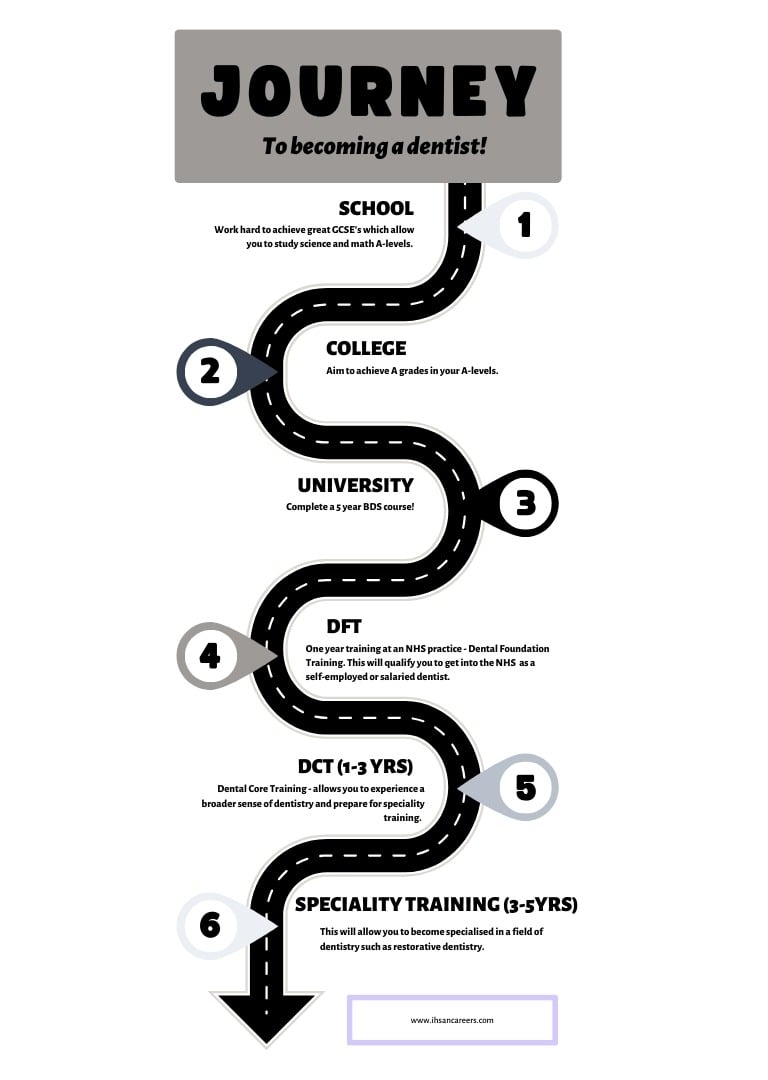A Guide to Getting into Dental School!
This is a short and succinct guide for students who are interested in becoming dentists in the UK.
GUIDEGUEST
Tasnim I.
3 min read


For most students, the journey includes enrolling in a five-year university course and doing dental training in the NHS after graduation. However, this can vary depending on your personal situation, goals, and preferences!
Let’s start off by understanding the role of a dentist. It’s important to have a thorough idea of what you would be doing in this career, given that you will be investing 5 years of your time to equip the basic knowledge and skills required for a trainee dentist! In the UK, dental healthcare professionals are governed by the General Dental Council, which oversees the safety of the public and the professionalism of all dentists. As a team leader, a dentist collaborates with a multidisciplinary dental team to diagnose and treat dental problems. They collaborate with other dental professionals such as dental nurses, dental hygienists, dental radiographers, dental technicians as well as admin staff and practice managers. A routine day in primary care at a general dental surgery typically involves recording patient information, such as their medical and dental history, performing check-ups, such as an oral examination and providing the relevant treatment. Dentists gather information about a patient by conducting investigations such as sensitivity testing and taking X-rays. By using their dental knowledge and decision-making skills, they will diagnose and choose the appropriate treatment for the patient. Dentists have a wide array of skills as they will need to be able to conduct these different types of testing and treatments:
Taking histories
Extra and intra-oral examinations
Recording a dental chart
Taking X-rays and examining radiographs
Oral Hygiene Cleaning
Teeth Whitening
Root Canal Treatment
Performing extractions
What does the journey to becoming a dentist look like?
As previously mentioned, you would need to study dentistry at a university for 5 years and graduate with a Bachelor of Dental Surgery degree. Accelerated courses for graduate students are available and take 4 years to complete. If you want to work in the NHS, you must complete a year of Dental Foundation Training at an NHS training practice, for which you will be paid a basic salary. Currently, in the UK, there is some discussion about whether to make this compulsory for students despite their intention to work privately or for the NHS. Following this, Foundation dentists can partake in further training called Dental Core Training, which allows them to prepare for specialist training. DCT can vary from 1-3 years of training, and it can lead to starting your specialist training. One of the splendid features of dentistry is its wide array of specialisms, which include:
Academic Clinical Fellowships
Dental and Maxillofacial Radiology
Dental Public Health
Endodontics
Oral and Maxillofacial Pathology
Oral Medicine
Oral Surgery
Orthodontics
Paediatric Dentistry
Periodontics
Restorative Dentistry
Special Care Dentistry
What are the entry requirements to get into dental school?
Different dental schools have different preferences, and therefore, it is important to seek different university websites to gather more information on requirements. Generally, you need to have the following:
Good GCSE grades
Good A-levels
I have done the required entry exam, e.g., UCAT.
A good presentation of why you want to study dentistry in your personal statement.
Examples of relevant work experience in working with people (does not have to be in health care or dentistry).
In the UK, there are fewer universities that provide dental courses compared to other degree courses, and there is a smaller cohort intake, so it can be competitive. Despite this, there are ways you can maximise your chances of getting into one of them!
Apply to a mixture of universities across the country with bigger cohort intakes.
If you’re a graduate, apply to both 5-year and 4-year courses (don’t limit yourself to 4-years.)
Apply to both UCAT and non-UCAT-requiring universities.
Practice doing UCAT questions way in advance.
Gain work experience in shadowing a dentist.
Practice interview skills with as many people as possible.
Study and research the role of a dentist and what skills you would require.


◆
◆
◆




